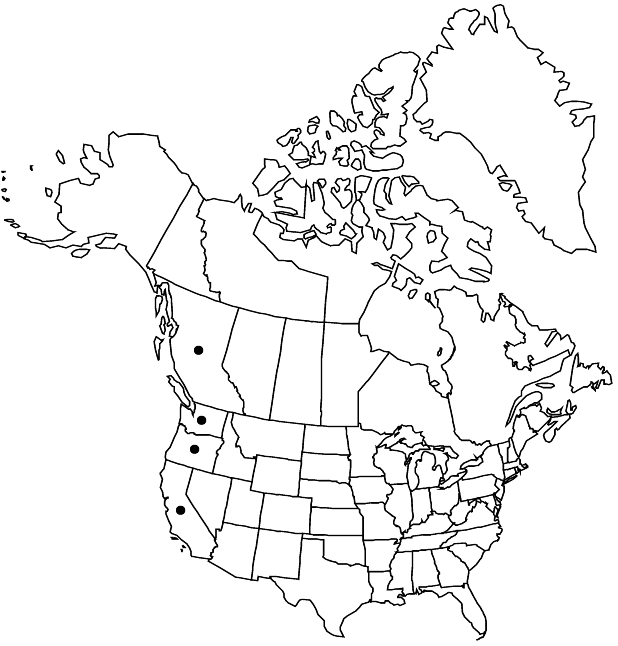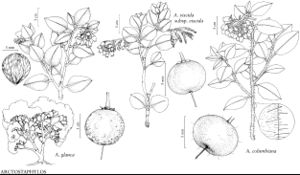Difference between revisions of "Arctostaphylos columbiana"
in C. V. Piper and R. K. Beattie, Fl. N.W. Coast, 279. 1915 ,.
FNA>Volume Importer |
imported>Volume Importer |
||
| (One intermediate revision by the same user not shown) | |||
| Line 1: | Line 1: | ||
{{Treatment/ID | {{Treatment/ID | ||
|accepted_name=Arctostaphylos columbiana | |accepted_name=Arctostaphylos columbiana | ||
| − | |accepted_authority=Piper | + | |accepted_authority=Piper |
|publications={{Treatment/Publication | |publications={{Treatment/Publication | ||
|title=in C. V. Piper and R. K. Beattie, Fl. N.W. Coast, | |title=in C. V. Piper and R. K. Beattie, Fl. N.W. Coast, | ||
| Line 7: | Line 7: | ||
}} | }} | ||
|common_names=Hairy manzanita | |common_names=Hairy manzanita | ||
| + | |special_status={{Treatment/ID/Special_status | ||
| + | |code=F | ||
| + | |label=Illustrated | ||
| + | }}{{Treatment/ID/Special_status | ||
| + | |code=E | ||
| + | |label=Endemic | ||
| + | }} | ||
|basionyms= | |basionyms= | ||
|synonyms={{Treatment/ID/Synonym | |synonyms={{Treatment/ID/Synonym | ||
| Line 40: | Line 47: | ||
-->{{#Taxon: | -->{{#Taxon: | ||
name=Arctostaphylos columbiana | name=Arctostaphylos columbiana | ||
| − | |authority=Piper | + | |authority=Piper |
|rank=species | |rank=species | ||
|parent rank=genus | |parent rank=genus | ||
| Line 53: | Line 60: | ||
|publication title=in C. V. Piper and R. K. Beattie, Fl. N.W. Coast, | |publication title=in C. V. Piper and R. K. Beattie, Fl. N.W. Coast, | ||
|publication year= | |publication year= | ||
| − | |special status= | + | |special status=Illustrated;Endemic |
| − | |source xml=https:// | + | |source xml=https://bitbucket.org/aafc-mbb/fna-data-curation/src/2e0870ddd59836b60bcf96646a41e87ea5a5943a/coarse_grained_fna_xml/V8/V8_805.xml |
|subfamily=Ericaceae subfam. Arbutoideae | |subfamily=Ericaceae subfam. Arbutoideae | ||
|genus=Arctostaphylos | |genus=Arctostaphylos | ||
Latest revision as of 22:46, 5 November 2020
Shrubs or trees, erect, 2–5 m; burl absent; twigs densely short-hairy, usually with long, white hairs, often glandular. Leaves: petiole 4–10 mm; blade dark green, dull, lanceolate-ovate to narrowly oblong-ovate, 4–6 × 2–3 cm, base cuneate to ± rounded, margins entire, plane, surfaces ± papillate, finely scabrous, finely hairy, sparsely glandular-hairy. Inflorescences panicles, 3–8-branched; immature inflorescence pendent, branches ± spreading, axis 1.5–2.5 cm, 1+ mm diam., densely short-hairy, usually with long, white hairs, sometimes glandular; bracts not appressed, (green), leaflike, oblong-lanceolate, 10–18 mm, apex acuminate, surfaces finely glandular-hairy. Pedicels 2–4 mm, finely glandular-hairy. Flowers: corolla white, conic to urceolate; ovary densely white-hairy, sometimes sparsely glandular. Fruits depressed-globose, 8–11 mm diam., sparsely hairy. Stones distinct. 2n = 26.
Phenology: Flowering winter–early spring.
Habitat: Chaparral, gaps and margins of conifer forests along coast, sometimes extending inland, open areas around rock outcrops
Elevation: 0-1000(-1400) m
Distribution

B.C., Calif., Oreg., Wash.
Discussion
Arctostaphylos columbiana is widespread near the coast from northern California to southern British Columbia; it extends inland along the Columbia River Gorge in Oregon and Washington, and inland in Oregon to the western base of the Cascades. Some variation in twig indument occurs in the prominence of longer, stiff hairs, and in the degree of glandulosity. Some plants along the immediate coast of northern California into Oregon lack the longer hairs and have been distinguished as var. tracyi. Hybrids with A. uva-ursi are low shrubs (0.5–1 m) with intermediate vegetative characters. Referred to as A. ×media Piper, these hybrids have been reported from British Columbia, California, Oregon, and Washington.
Selected References
None.
